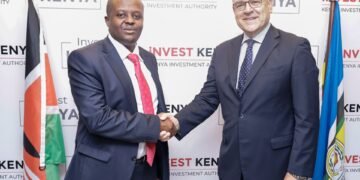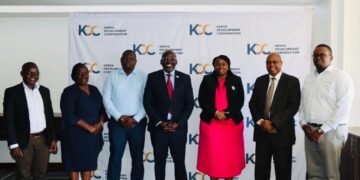The Government of Ghana, in collaboration with Ascend Digital, K-NET, Radisys, Nokia, and Tech Mahindra, supported by All Mobile Network Operators including AirteITigo-AT and Telecel, has launched the Next-Gen InfraCo (NGIC) with the aim to deliver affordable 5G mobile broadband services.
The Minister for Communications and Digitalisation (MoCD), Mrs. Ursula Owusu-Ekuful (MP) at her press briefing today at Ministry of Information in Accra, said that the launch of the Next-Gen InfraCo (NGIC) was a groundbreaking partnership and a new shared infrastructure company that would spearhead the digital transformation agenda.
She noted that NGIC was a landmark event for Ghana, promising to revolutionize the nation’s digital landscape. With the combined efforts of local and international partners, Ghana was set to achieve its vision of a fully digitized nation by 2030, ensuring that every citizen, regardless of location, benefits from the latest digital services.
Mrs Owusu-Ekuful revealed that the partnership was officially signed in Mumbai, India, on May 27, 2024, culminating a process that began over two years ago, and was finally time for the NGIC to roll out its 5G services within the next six months. Adding that after its implementation, Ghana plans to expand the initiative to other parts of Africa in future.
“The initiative aims to propel Ghana towards a fully digitized nation by 2030, ensuring universal access to high-speed, secure, and seamless mobile services. The project is expected to optimize capital expenditure, reduce the digital divide, and promote economic growth through digital entrepreneurship and improved quality of life”, she said.
Overview of the Partnership
The Next-Gen InfraCo (NGIC) is a new shared infrastructure company, co-promoted by the Government of Ghana, Ascend Digital, and K-NET. This partnership includes leading technology providers Nokia, Radisys and Tech Mahindra. Discussions will soon be finalised with Microsoft, which has expressed an interest in this project. NGIC’s equity will be held by the Republic of Ghana, Ascend Digital, K-NET, all Mobile Network Operators in Ghana and other investors including the technology providers who may wish to join the consortium.
NGIC has been awarded a 5G license and is expected to launch 5G services across Ghana within the next six months, with plans for future expansion into other parts of Africa. The shared 4G and 5G infrastructure will be built by Nokia and Radisys, with IT architecture and integration provided by Microsoft and Tech Mahindra. This collaboration ensures that we leverage cutting edge world-class expertise and technology to build a robust digital infrastructure.
NGIC’s neutral hosting model and Network-as-a-Service (NaaS) offering will accelerate national enablement programs, reduce the digital divide, optimize capital expenditure, and ensure efficient operating costs while respecting Environmental, Social and Governance (ESG) fundamentals by reducing environmental impact and carbon footprint. This innovative approach will make high-speed, secure, and seamless mobile services accessible to all Ghanaians.
All MNOs and ISPs are part of the venture and have been invited to invest in the project. It is believe it even has the potential of attracting renowned MVNOs to consider operating in Ghana, providing more choice to consumers. The initial focus is on building a scalable shared infrastructure in Ghana, with the potential to expand to other parts of Africa. NGIC may seek additional funding through capital markets to support future scaling. NGIC aims to be the first 5G Mobile Broadband Shared Infrastructure Entity to build a nationwide 4G/5G network. The company plans to launch affordable 4G/5G[1]enabled Fixed Wireless Access (FWA) CPEs and smartphones within this calendar year.
Impact on Ghana’s Economy
NGIC’s initiative will significantly impact Ghana’s economy and society. By democratizing mobile broadband services, the project will enable MNOs to focus on customer excellence and deliver innovative services. This infrastructure is poised to attract investments across various sectors, offering a foundation for new services through e-Gov initiatives and private sector growth.
The rollout of 4G and 5G networks will bridge the digital divide, particularly benefiting rural communities. The NGIC network will enhance digital services in education, healthcare, and financial transactions, creating sustainable jobs and promoting financial inclusion.
The successful implementation of NGIC will set a precedent for other African countries, positioning Ghana as a leader in digital transformation. By 2028, NGIC aims to deploy 4,400 sites, reaching 37 million end customers, with the goal of achieving 100% digital coverage by 2030. The project’s success will hinge on increasing 4G penetration from the current 15% to over 80%, while simultaneously rolling out 5G services.
Ghana’s proactive approach, supported by a robust regulatory framework and government backing, places it at the forefront of digital innovation in Africa. The collaborative model adopted by NGIC, inspired by successful implementations in countries like Malaysia, Germany, and the United States, will ensure efficient resource use and equitable access to 5G services.



































































